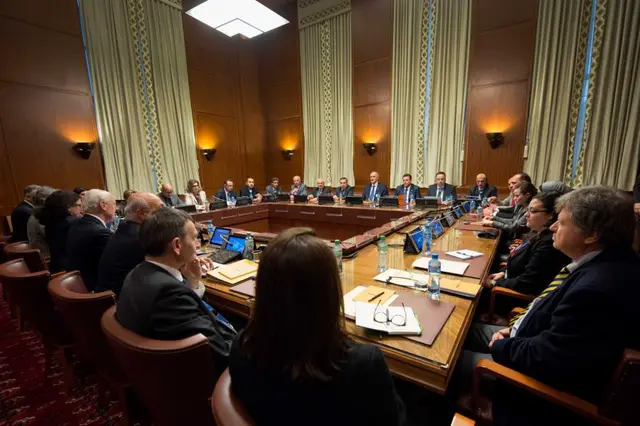As Syrian factions gather in Geneva to broker peace for the war-torn country, doubts remain as to whether UN-sponsored intra-Syrian talks will enable Bashar al-Assad's regime and Syria's opposition see eye to eye this time round.
The initial stages of talks, which ultimately aim to discuss governance, constitutional change and the holding of elections while addressing the implementation of a lasting ceasefire and stopping the threat of Islamic State(IS), have indeed been tainted with uncertainty from the outset.
Who to invite and whether or not the High Negotiations Committee (HNC) for opposition groups would actually attend remained ambiguous until the last minute, delaying the start of meetings originally planned for January 25 by four days last week.
Despite this setback, both sides were present in Geneva by January 31, though the HNC's appointed head, Riyad Hijab, was not amongst those who landed in the Swiss city on Sunday.
By the time Hijab's controversial chief negotiator Mohammed Alloush, who is part of the powerful Army of Islam rebel group, arrived in Geneva the following day, both the Syrian regime delegation and the HNC had held closed-door meetings on separate occasions with UN Special Envoy for Syria Staffan de Mistura, whose role is to mediate between both parties.
Though seen as a positive step, dynamics have taken a downwards turn as sides fail to agree on the execution of priorities which will hopefully kick-start constructive discussions between both factions.
De Mistura had planned to meet both the Syrian government delegation and the HNC on Tuesday, which would have been the first time both sides meet the special envoy on the same day.
Only the former of the two meetings took place however after the HNC, which unites Syrian mainstream political opposition and rebel groups, considered that military attacks recently carried out by Assad's regime and Russia in Aleppo and Homs were jeopardizing the political process.
As tensions rise, even the official start date of talks remains controversial.
De Mistura announced that they had officially kicked off on Monday following his first meeting in the Palais des Nations with the HNC.
This statement was subsequently refuted by Syrian ambassador to the UN and head of the Syrian government delegation Bashar Jaafari who said that the right circumstances had not yet been met and that discussions were still in their preliminary stages.
"You know that to be able to officially declare the beginning of discussions, both sides and delegations must do so on site, something which has not been achieved yet," he highlighted on Tuesday.
This is the second time delegations have come to Geneva in view of finding a political solution to the Syrian crisis in which 250, 000 Syrian people have died, with over 4 million people fleeing the Middle Eastern country as a result of protracted violence.
Vested international interests have certainly rendered peace-efforts more complex, while the threat of terrorism and the massive influx of Syrian refugees into neighbouring countries and Europe have also jump-started efforts to solve political cleavages in Syria itself.
For now, whether or not talks will lead to tangible improvements for the Syrian people remains unclear as Syria and the world look desperately for any sign of positive development. Enditem
 简体中文
简体中文

